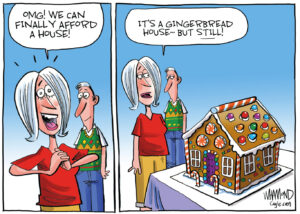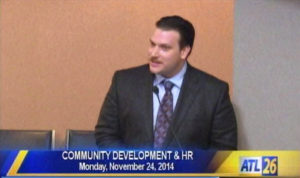Ben Carson Rolls Back Fair Housing Rules, Making Discrimination Easier
The HUD chief believes the regulations, designed to ensure prospective buyers get equal treatment, stifle affordable housing development. Secretary of Housing and Urban Development Ben Carson. (John Locher / AP)
Secretary of Housing and Urban Development Ben Carson. (John Locher / AP)
Ben Carson made headlines earlier this year for using government money to purchase a $31,000 office dining set, but the Housing and Urban Development secretary’s expensive taste in furniture isn’t his only quality garnering criticism from housing and civil rights advocates. They’re concerned that under Carson, HUD is not only ignoring, but actively gutting rules aimed at preventing racial discrimination in housing.
Carson, The Washington Post reported Monday, suspended an Obama-era fair housing rule that required local governments to submit desegregation plans before receiving federal housing funds, claiming, as NBC reported, that it was “suffocating investment in some of our most distressed neighborhoods that need our investment the most.”
He also bragged during a HUD training about suspending that rule and another holding housing lenders and landlords accountable for policies that resulted in discrimination, even if it was unintended. It was a shock to an audience who had spent their careers fighting housing discrimination. The scene, Post writer Tracy Jan observed, “illustrated the uncomfortable reality for Carson as he nears the end of his second year as HUD secretary. Though he is charged under the law with eliminating discriminatory housing practices, Carson is also a longtime skeptic of using government power to remedy such inequality.”
In addition to rolling back multiple fair housing rules, Carson has “departed from the practices of recent Democratic and Republican predecessors of using their secretarial power to root out systemic racial discrimination by launching broad-based investigations into bias by banks, real estate companies and others,” the Post noted.
Even previous Republican administrations used this power more than Carson has, investigating insurance companies, banks and real estate brokers accused of not showing certain homes in certain neighborhoods to black buyers, and mortgage companies that refused to lend to black and Hispanic buyers.
“If you’re going to have this position, you have to use it,” Kim Kendrick, the former HUD assistant secretary for Fair Housing and Equal Opportunity under George W. Bush, told the Post.
At least one attempt to protect fair housing laws from Carson has proved unsuccessful.
In May, housing advocates from National Fair Housing Alliance, the Texas Low Income Housing Information Service and Texas Appleseed sued HUD for suspending the 2015 anti-discrimination rule. They alleged, as Slate reported, that “the Fair Housing Act is largely useless without the rule to support it.” In addition, the plaintiffs said in a statement that “[u]nder HUD’s pre-2015 process, jurisdictions throughout the country routinely ignored problems of segregation and discrimination while continuing to collect HUD funds.” A federal judge dismissed the suit in August.
Carson has long been against a strong government role in combating housing discrimination. In a 2015 editorial for the conservative-leaning Washington Times, Carson called fair housing policies “failed socialist experiments.” His defenders argue that rather than abandoning HUD’s mission, they are simply focusing on individual cases of reported housing discrimination rather than taking broad, industrywide action. “Nearly 500 people had their cases resolved,” HUD spokesman Jereon Brown told the Post, “versus focusing our resources on larger secretary-initiated cases.”
Robert Driscoll, a deputy assistant attorney general in the Justice Department’s civil rights division during the Bush administration, believes a focus on individual cases is in line with mainstream Republican thinking. “If an individual is rejected for housing because he is black—those kinds of cases should always gain traction in a conservative administration … Republicans are more likely to see problems with defining discrimination based on group statistics.”
Carson has used his agencies’ power to investigate housing discrimination only once, when, under public pressure, he continued an investigation into Facebook started under President Obama.
According to Aderson François, a professor at Georgetown University Law Center, this lack of action sets a dangerous precedent. And worse, “HUD is in danger of becoming something of a zombie agency,” which would make it a lot easier for banks, mortgage companies, real estate brokers and lenders to use discriminatory practices without government oversight.
He added, “If the folks you are supposed to regulate know you are essentially not enforcing the law, they have no incentive to behave.”
Your support is crucial...As we navigate an uncertain 2025, with a new administration questioning press freedoms, the risks are clear: our ability to report freely is under threat.
Your tax-deductible donation enables us to dig deeper, delivering fearless investigative reporting and analysis that exposes the reality beneath the headlines — without compromise.
Now is the time to take action. Stand with our courageous journalists. Donate today to protect a free press, uphold democracy and uncover the stories that need to be told.






You need to be a supporter to comment.
There are currently no responses to this article.
Be the first to respond.